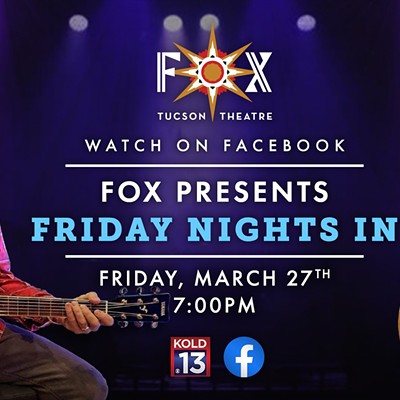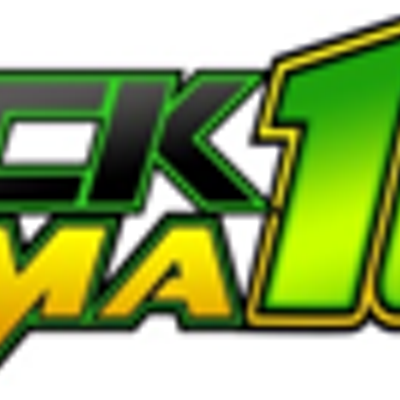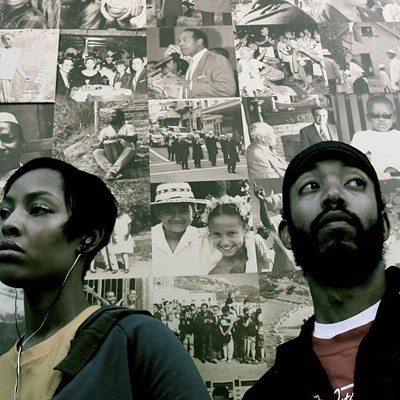Singer/guitarist Nick Urata's cell phone sounds so shoddy, he surely must have purchased it from a Mongolian vendor somewhere on the Road of Bones. That, or Urata is transmitting from Mars. And believe us, DeVotchKa is such a cosmic and masterful blend of klezmer, mariachi, polka, Spaghetti Western and bolero that the band could perform gigs in outer space and Outer Mongolia and sound right at home in both.
"My phone is dying," Urata explains. "Tell me your name again so that I may reach you if we become disconnected."
There's a lot of drama in such a statement, which makes sense. After all, DeVotchKa--once named the No. 1 "Unsigned Band in America" by CMJ--is now composing music for films. Sure, there's always been a bit of showbiz in this Denver quartet. In fact, DeVotchKa started out as a live band that toured with a burlesque troupe. But now DeVotchKa's signature ballad, "How It Ends," appears in the cinematic adaptation of Jonathan Safran Foer's Everything Is Illuminated.
"The band Gogol Bordello became our friends," explains Urata. "They passed our music on to the film's producers, and they loved 'How It Ends.'"
They weren't the only producers to take note of DeVotchKa's haunting gypsy-rock sound. Almost simultaneously, the band was invited to score the movie Little Miss Sunshine. (For more on the film, see Page 37.)
"It was an extreme roller-coaster ride, like any musical project," admits Urata. "It started out like the typical indie film in the sense that it took a long time to get up and running. There was pre-planning, and planning for the pre-planning, and a lot of trial and error on the part of the film's producers. As a result, much of the music we created didn't make it into the film.
"You can grow really attached to the music you write, but we also learned a valuable lesson from the experience--namely, that just because you love something doesn't mean the world does. It was actually quite wonderful to be stimulated by someone else's visual ideas. It's interesting how you can often draw inspiration from someone else's emotional world."
None of this means DeVotchKa--comprising Urata, and multi-instrumentalists Jeanie Schroder, Shawn King and Tom Hagerman--has forgotten where it comes from. This is a band that still resorts to playing Mexican restaurants and Jewish weddings in order to pay the bills.
"We're an NC-17 band," adds Urata, "so we don't get many bar mitzvah gigs."
Still, DeVotchKa has performed in stranger settings than a Salvadoran joint in downtown Denver. Indeed, the band members once found themselves sandwiched in the middle of a metalfest bill in Flint, Mich.
"We thought we were going to be killed," says Urata, "but the young audience loved it. They connected with our music in ways we couldn't have anticipated."
The most surreal circumstances under which DeVotchKa has performed, though, occurred last Halloween, when the band opened for Marilyn Manson in Denver.
"We'd painted our faces and wore outfits so that we resembled a Day of the Dead mariachi band. We thought we would be striking. What greeted us was even more intense: thousands of 13-year-old faces done up in the style of Insane Clown Posse or something. Needless to say, shit was thrown at us."
In any case, DeVotchKa is now touring in support of its new Curse Your Little Heart EP, a collection of covers of songs made famous by Frank Sinatra, the Velvet Underground, and Siouxsie and the Banshees, among others. Coming to Tucson is always a kind of homecoming, since the band recorded its 2004 full-length bravura effort, How It Ends, as well as its 2003 debut, Una Volta, at WaveLab Studios.
"We got turned on to WaveLab by Calexico. That band really had an effect on us, since they were touring with a mariachi band at the time we met them. We love WaveLab, because there, they strive for an analog, organic approach to music. It's not about recording little bits and putting them on a computer. Also, it's always too hot in Tucson, which means you can't get distracted from performing and recording music indoors. That's why there's so much good music in Tucson. People can't leave their homes without bursting into flames."
Indeed, DeVotchKa has been at this for a long time. Now, all of a sudden, people are coming to the band's shows knowing the words to every song. Clearly, it's a righteous moment.
"Righteous?" says Urata. "Actually, it's more of a redemption."










